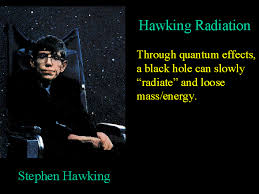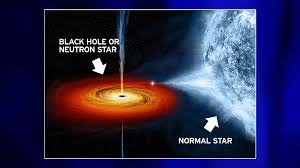 )source
)source
The explanation of the formation of a black hole I am going to be giving during this write up is based mainly on Hawking's assumptions and theories.
.jpg)source
The black hole is something that is not yet properly understood, this mingth be because you cannot actually see it.
A black hole is actually a star who suffered from its ows gravitational pull on its self. The gravitational pull on a heavenly body is relative to the size of the body, so the larger the body the greater it's gravitational pull. So a celestial body of about three to six times the size of the sun will have enough gravitational pull to crush that body.
A black hole forms in stages first the star becomes a white dwarf this occurs when the gravitational pull on the star starts crushing the star and forcing the star to collapse into it's self. If the star is only about the size of the sun, the gravitational pull will continue to crush the star until it becomes only about 865,000 miles across, the gravitational pull will not be able to crush the star much further than this so it remains at the white dwarf stage. Here the velocity needed to escape from this star, that is the escape velocity becomes about 2100 miles per second mean why it's original escape velocity was about 380 miles per second.
If that star was about 3.6 or more times the size of the sun, the gravitational pull on that star would be much more and so it would not stop crushing the star at the white dwarf stage, it would continue crushing it till the star becomes a neutron star, here the escape velocity of that star becomes about 120,000 miles per second or more. At this stage for a rocker to escape from this star it would have to be moving about or faster than this speed. If you take a cup full of substance let's assume sand from this star and weight it on the star, it would weigh more than a ton. If the star was about three to six times the size of the sun, the gravitational pull will not stop there, it will continue crushing the star, It will get to a stage where it would take an object moving at the speed of light I.e 186,282 miles per second to escape from that star, but the gravitational pull will not stop crushing the star at this stage it will continue up to the extent that the the speed of light would no longer be enough to escape from this star, at this stage the gravitational pull claims light as it last victim so that the star would then become invincible I.e appear to have disappeared. This is when the star becomes a black hole. At this stage, the star would be capable of swallowing a full star.
.jpg)source
Thanks for your time..jpg)